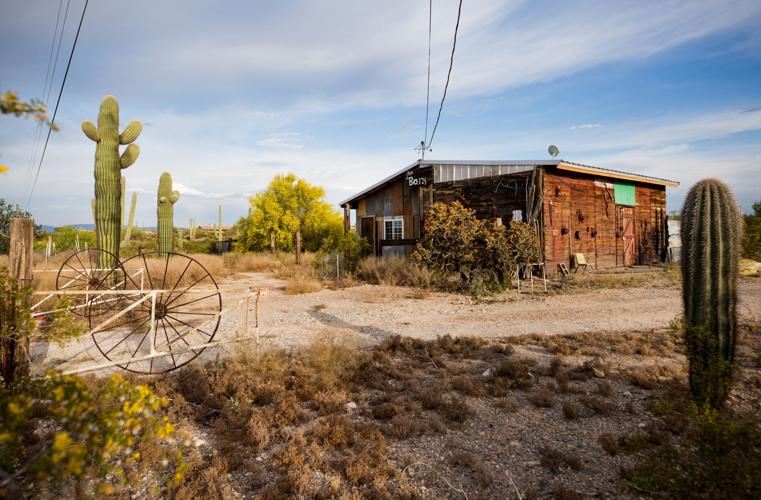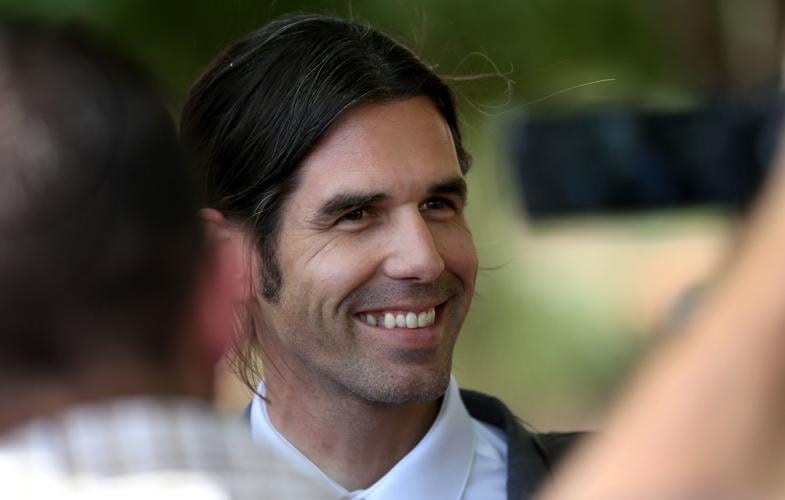Newly unsealed court records help tie together the threads of the high-profile Border Patrol investigation of a border-aid worker in Ajo.
Agents built their case against Scott Warren, a 36-year-old teacher and volunteer with the Tucson-based humanitarian aid group No More Deaths, around interviews with Ajo residents upset with volunteers who left water and cans of beans in remote areas where migrants die during illegal border crossings. That practice earned volunteers the local nickname “bean droppers.”
Investigators also leaned on what was “revealed” when the Border Patrol raided a longstanding No More Deaths camp in Arivaca in June 2017, according to documents unsealed July 19 in U.S. District Court in Tucson. Agents arrested four migrants who were given food, water, shelter and clothing by No More Deaths volunteers at the camp. An agent said that led him to suspect the same was happening at an Ajo aid station where Warren was arrested in January 2018.
Warren faces felony human-smuggling charges of harboring two Central American men at the aid station in Ajo. He is the first border-aid worker to face such charges in Tucson’s federal court in more than a decade.
A trial last month in U.S. District Court in Tucson ended in a mistrial when jurors could not reach a consensus on charges of harboring and conspiracy. Instead, they split 8-4 in favor of acquittal. On July 2, prosecutors said they would retry Warren, but dropped the conspiracy charge.
Early in the case, prosecutors and Warren’s defense lawyers reached an agreement about disclosing documents, including exhibits filed in the case. The Intercept, an online investigative news site, challenged the sealing of exhibits in the case. On July 11, Judge Raner C. Collins ordered the exhibits unsealed once prosecutors redacted certain information.
Prosecutors had argued the exhibits should remain sealed because of the disclosure agreement, but Collins said that argument was “not a compelling interest or a compelling reason” and “cannot be reconciled with the public’s right to know.”
The monthslong investigation was discussed in court documents and at the trial, but never in such detail as seen in the unsealed documents, some of which turned out to be similar to documents commonly released in state prosecutions.
The U.S. Attorney’s Office declined to comment.
A volunteer with No More Deaths, Paige Corich-Kleim, said they became “aware that something had shifted in the Border Patrol’s attitude towards our group” after the June 2017 raid on the No More Death’s camp in Arivaca.
“The unsealed documents confirm that belief,” she said.
Border Patrol Agent John Marquez referred to the Arivaca raid in his report on Warren’s arrest at The Barn, as the aid station in Ajo is known.
“NMD was long suspected of illegally harboring and aiding illegal aliens and a search warrant for their illicit activities was recently executed at their humanitarian station near Arivaca, Arizona,” Marquez wrote in the Jan. 17, 2018, report.
The search warrant resulted in the arrest of several migrants, Marquez wrote.
“Through execution of the search warrant it was revealed that NMD would provide illegal aliens with food and water along with showers and new clothes to wear to further their illegal entry into the United States,” Marquez wrote.
After watching Warren point out nearby mountains to the two Central American men outside The Barn, Marquez wrote: “Given these facts and the history of this NGO (nongovernmental organization) in their previous illicit activities at the Arivaca humanitarian station, I suspected that the two subjects could be illegal aliens.”
At the time of the Arivaca raid, a Border Patrol spokesman told the Arizona Daily Star the arrests did not signal a change in policy with regard to how agents dealt with humanitarian aid groups.
Agents arrived at the camp after following footprints of four people suspected of tripping a sensor after crossing the border illegally, Border Patrol spokesman Agent Vicente Paco said at the time. The suspected border crossers would have been arrested before they arrived at the camp but agents did not catch them in time, he said.
Tucson Sector management had given agents “guidance” not to interfere with water stations or “actively surveil” humanitarian aid facilities or camps, Paco said. However, if probable cause existed to believe illegal activity was occurring at the facility or camp, then agents would apply the law.
Agents did not arrest any No More Deaths volunteers at the Arivaca camp.
The Barn was the only suspected stash house for migrants in Ajo busted by Border Patrol agents in 2018, according to a review by the Star of felony human-smuggling cases at U.S. District Court in Tucson. Warren also was the rare case that did not involve money changing hands or compensation of any kind.
Up until shortly before the trial began, Warren’s defense lawyers argued he was arrested in retaliation for No More Deaths releasing a report hours earlier that showed agents destroying water jugs left for migrants.
Prosecutors wrote in a January court filing that a text message exchange the day of Warren’s arrest “strongly suggests that BPA Marquez was unaware of No More Deaths’ press release or report when he made the decision to surveil the Barn.”
About four hours before Warren’s arrest, Marquez exchanged text messages with U.S. Fish and Wildlife Officer Donald Ebann. Marquez said he and another agent were planning to set up “for a few hours to watch the barn.”
No More Deaths “is going to be on news channel 4 tonight at 10 pm talking about vandalism to their water drop sites,” Ebann texted to Marquez.
“Oh wow. That’s awesome. Wonder who they are gonna blame,” Marquez replied with apparent sarcasm.
“BP mainly,” Ebann texted, referring to the Border Patrol.
“Yeah. Prolly,” Marquez replied, using a slang version of “probably.”
As the agents surveilled The Barn, they exchanged text messages about what they were seeing. One exchange appears to show an agent was surprised that migrants were at The Barn.
“2 toncs at the house,” Burns texted, using Border Patrol slang for migrants.
“What!?!?!?!?!?! Nice!,” another agent responded.
With regard to the term “toncs,” Customs and Border Protection said in a statement that “there is no clear answer on where the term originated or if it was once considered an acronym, but flatly, it is now considered a derogatory term and CBP does not condone its use.”
A status conference in Warren’s case is scheduled for Aug. 5. His trial is scheduled to begin Nov. 12.





